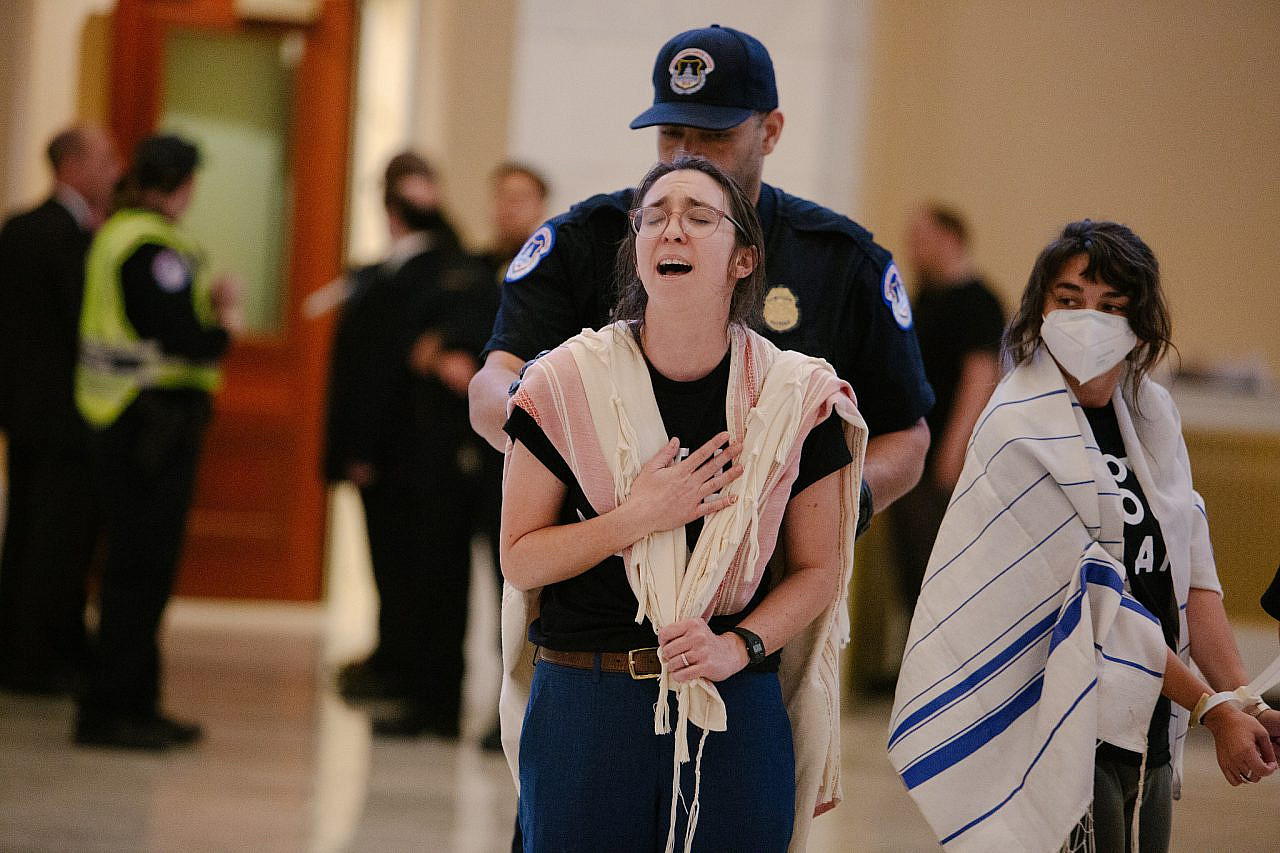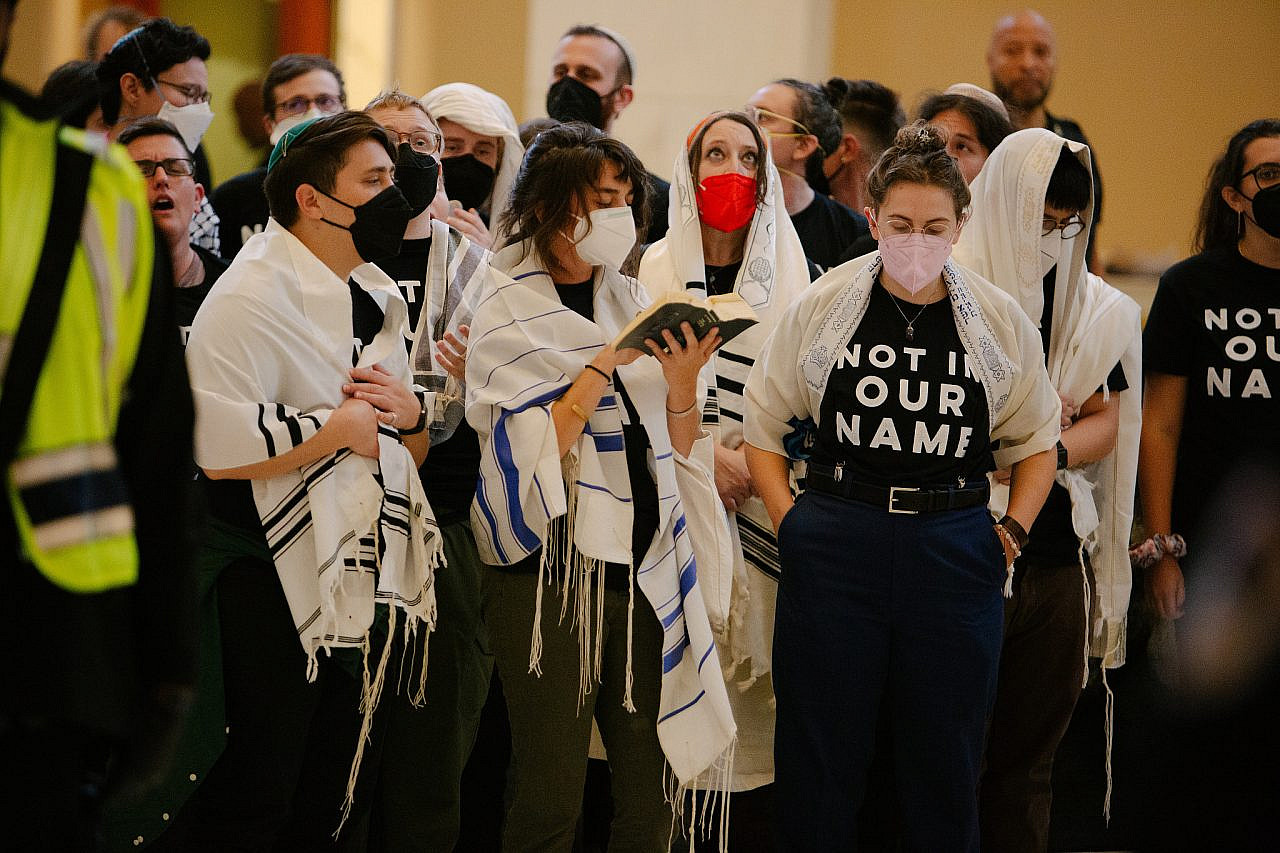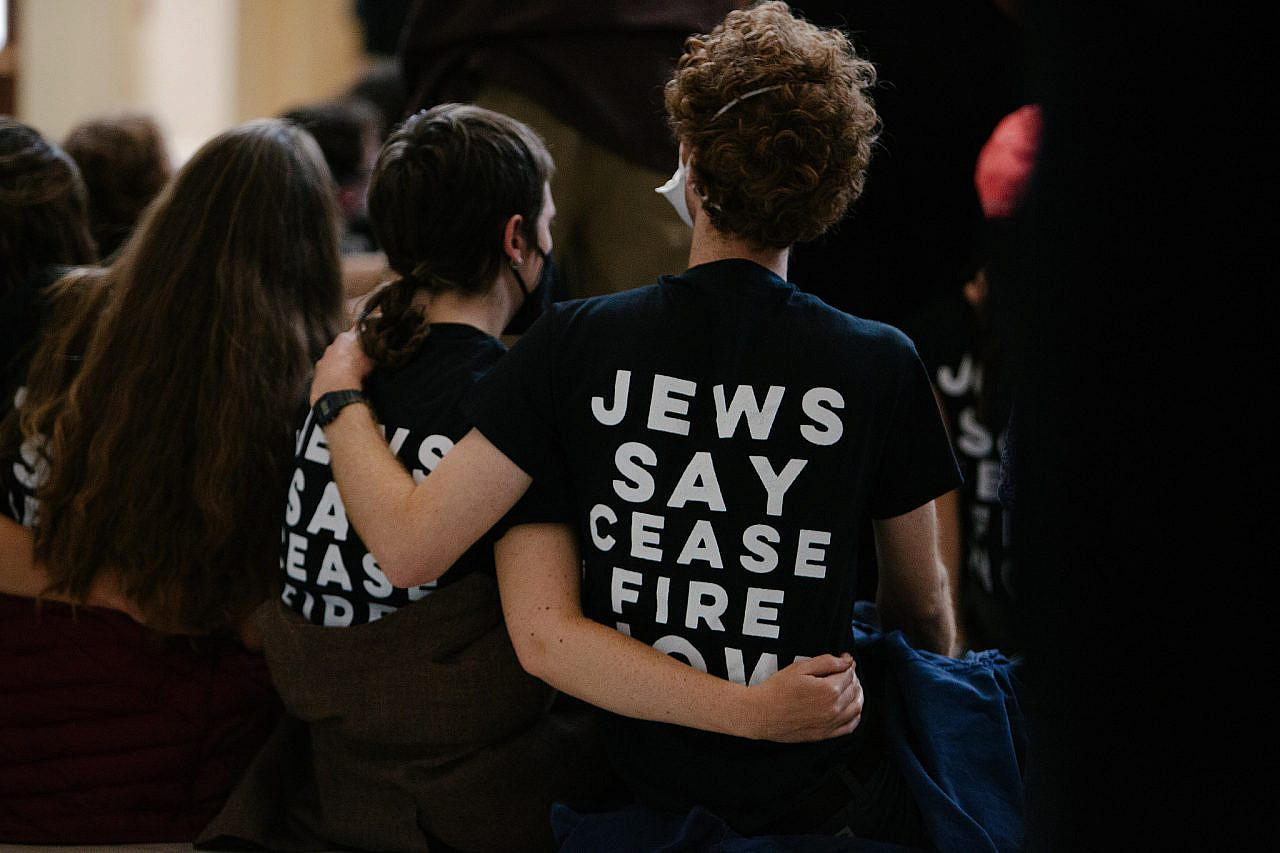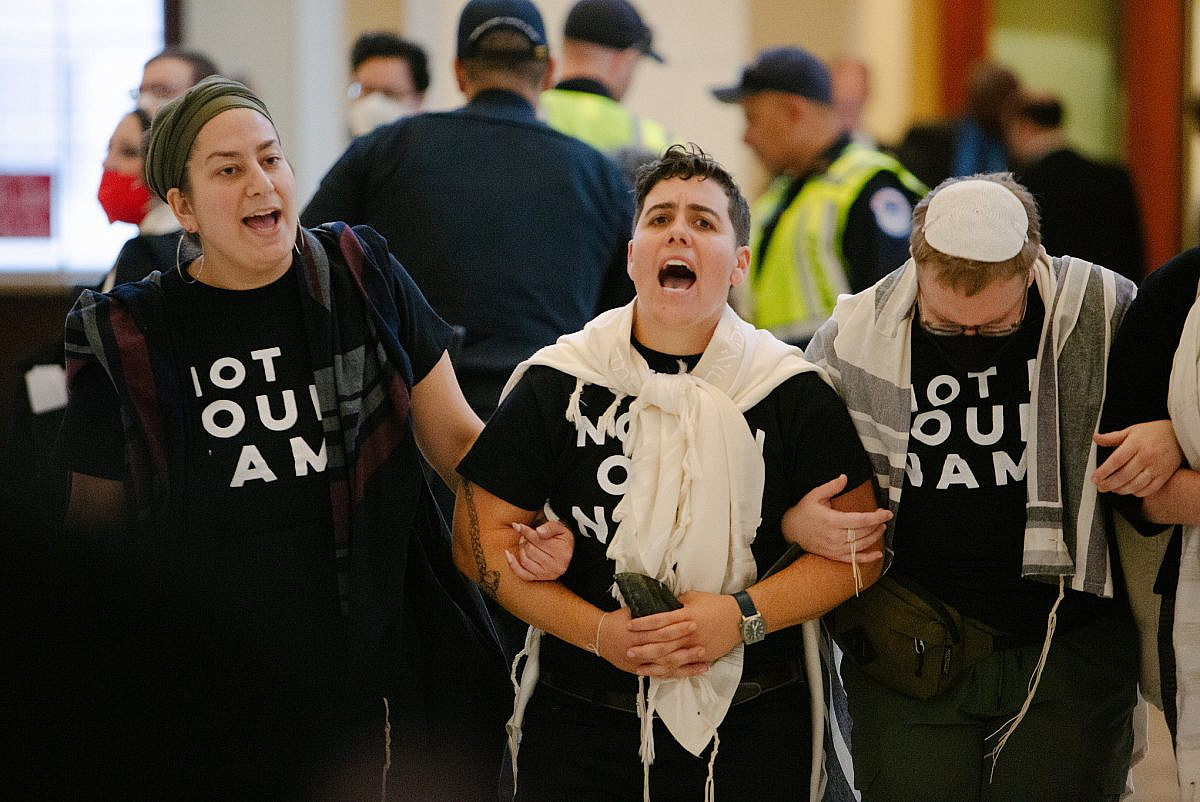On Oct. 18, I gathered alongside thousands of Jews and allies in Washington, D.C., to demand that the U.S. government support a ceasefire between Israel and Hamas. As a Jewish American, I joined the protest to say that we will not allow our grief and fear for Israeli family members, friends, and colleagues to be used to justify the ongoing violent collective punishment the Israeli government is carrying out in Gaza and the West Bank.
After the protest began on the National Mall, a smaller group of about 500 activists and organizers staged a sit-in at the Cannon House Office Building on Capitol Hill. We gathered in the building’s rotunda, unfurled banners that read “Ceasefire Now” and “Mourn the Dead, Fight like Hell for the Living.”
As the rotunda filled, I stood in the middle of the room with other rabbinical students and rabbis, leading chants for justice and songs for peace. Between chants, we took turns reading testimonies from Palestinians living under military siege and assault in Gaza. We shared their words of grief, fear, and, amid it all, hope that someday they would have access to the same liberties and rights those of us living comfortably in the United States take for granted every day.
For hours, we created a collective cacophony — screaming for a ceasefire, singing the words of the prophet Isaiah, “Lo yisa goy el goy cherev, lo yilmedu od milchama” (“Nation shall not lift sword against nation, neither shall they learn war anymore”), and bursting into tears for the lives lost, the families torn apart, the futures that will never be. The collective grief and pain of everyone in that room struck me to my core.
Sitting in the rotunda, I remembered a conversation I had had with a Palestinian friend living in Masafer Yatta, in Area C of the occupied West Bank, in the days following the atrocities of Oct. 7. As we exchanged messages over WhatsApp, she asked me: “Are the people with us? All I see is that America supports Israel to kill the Palestinians.”

My already broken heart shattered into even smaller pieces. How could I show my friend that she was not alone? That there are people in the international community who will not be silent while these horrors happen? I wished I could transport her through checkpoints, borders, time, and space, to see that people were with her, to see how many Jews were with her.
We will not be silent
Over the past three-and-a-half weeks, a record number of U.S. Jews have taken action to protest the ongoing Israeli military assault on Gaza. Thousands of Jews are publicly rejecting the premise that Jewish safety comes at the expense of Palestinian liberation. We are taking to the streets to show our elected officials that we will not be silent while they exploit our grief to provide unsanctioned military support for the genocide of Palestinian civilians in Gaza.
Two days before the sit-in on Capitol Hill, hundreds of Jewish protesters blocked the entrances to the White House calling for a ceasefire. Last Friday morning, I joined a groundbreaking collaboration of over 80 U.S. rabbis and rabbinical students in a video statement calling for a ceasefire that includes an end to bombing, a return of all hostages, and access to humanitarian aid.
That evening, thousands of Jewish protestors filled Grand Central Terminal in New York City, calling for a ceasefire as they shut down the train station’s main concourse. Two protestors wearing black t-shirts reading “Not In Our Name” stood in front of the train station’s departure board holding a sign that read “Never Again For Anyone.” New York’s transit authority closed the terminal, and hundreds were arrested.

I was disheartened yet unsurprised to hear friends, colleagues, and teachers express anger and confusion about how rabbis and rabbinical students could participate in actions calling for a ceasefire. In their voices, I heard echoes of my friend’s question, “Are the people with us?” It was clear that our public calls for a ceasefire meant, to them, that we had abandoned our people to stand with the other side. Were we with them? Where was our Ahavat Yisrael (love for our fellow Jews)? Didn’t we care about Israeli lives lost?
I don’t believe my commitment to standing in solidarity with Palestinians comes at the expense of standing with my people. It is antithetical to my Jewish values to choose which lives to mourn, whose rights to fight for.
For me, the only way to redeem my Jewish identity and tradition is to reject the premise of using violence as a means for Jewish safety. Demanding a ceasefire now is an urgent step to building a future where everyone living in the Holy Land knows what it means to feel safe in their homes. I know that responding to pain and horror with terror and violence will never bring peace.
For life and liberation
Toward the end of the sit-in on Capitol Hill, after hundreds of activists had been arrested in waves over the course of hours and only 10 or 15 of us remained, we decided to daven Mincha — to recite the afternoon prayer. Our voices were hoarse from hours of crying and screaming. Our souls were raw from two-and-a-half weeks of witnessing mass killing. And still, we turned to this ancient practice, toward our tradition, toward our faith.

We opened our prayer books and began reciting the ancient words that have steadied our people for generations. We refused to let our religion be held solely in the hands of those who sought to discredit us.
There are many who refuse to hear non- and anti-Zionist voices, no matter how loudly or frequently we condemn antisemitism, or express our grief over Israeli lives lost alongside our mourning of Palestinians. They have decided our solidarity with Palestinians is inherently a threat to their identity.
In that decision they have closed the door on actually hearing what we have to say. They have written us off as leftist traitors and self-hating Jews. They are unwilling to see that we, too, have a right to interpret our texts and practice our traditions. I am not in this work due to a lack of Ahavat Yisrael; I am in this work because my love for my people runs deep, and I know that we can and must do better.
Most read on +972
At the end of the afternoon service, as I recited the Mourner’s Kaddish for all the Israelis and Palestinians whose lives had been taken, the rabbis with whom I was standing arm-in-arm were handcuffed and taken away, one-by-one. When we reached the end of kaddish, there were only three of us left in the rotunda. Together, we sang the words from Aly Halpert’s Ashrei, “I sing, for you. I sing for what is holy and is true. I sing for all creation, for life and liberation. Every day anew.”
We sang while each of us had our hands cuffed; as the police walked us through the halls; as our bodies were searched and our possessions taken into custody; as we waited in line to get on the bus to be taken into holding. We sang and we sang, and we prayed that we would be heard. That the people would know that we are with them.




